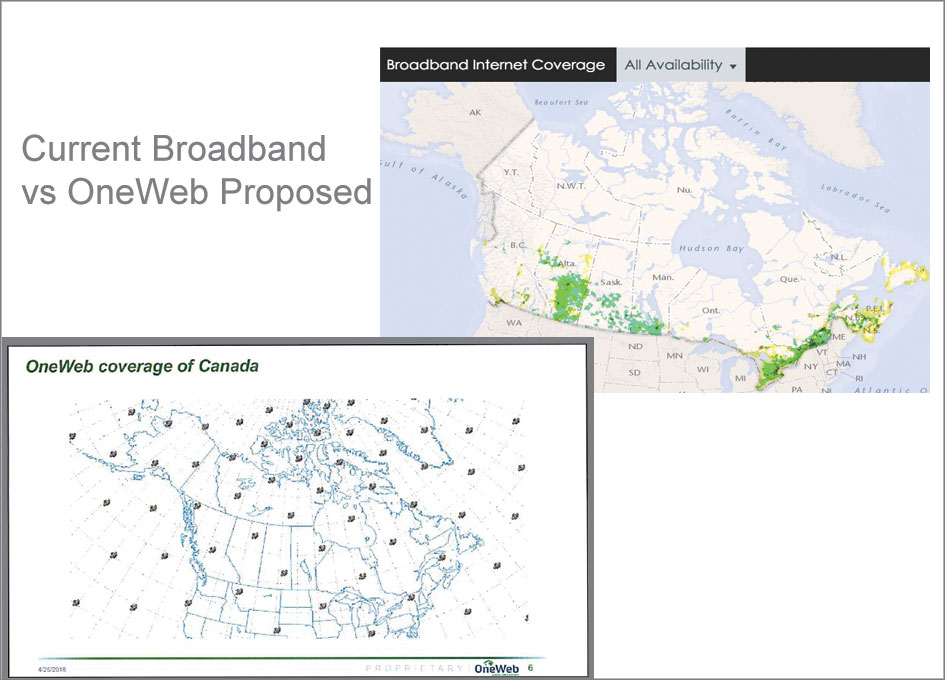The CRTC is currently holding hearings on the topic of reliable, affordable broadband Internet. For the majority of Canadians, access to broadband is not an issue. However for many, especially in rural and northern areas, access and affordability is a big issue. OneWeb explained the key technical issues and provided some suggestions on how the Government might want to move forward.
In his opening statement, available below, Greg Wyler, Founder and Chairman of OneWeb, introduced himself, his fellow panelists which included Marc Dupuis, Directory of Policy, OneWeb, Don Osborne, President, MDA and Leslie Swartman, Director of Public Affairs, MDA, and went on to describe what OneWeb is doing, how it will work and its importance in the Canadian context.

Simply put, OneWeb is building a new global satellite communications system to create affordable and reliable broadband services to communities around the world who don’t currently have access.
How will they accomplish this?
OneWeb will build 900 small satellite’s that will be launched into low earth orbit to provide global coverage for their services.
What does this mean for Canada?
With OneWeb’s planned coverage, and with the first satellites expected to go into service in 2019, it means 100% coverage for the whole country. And because of the the way the service will be rolled out, Canada’s northern communities could be the first to benefit.
What does it mean from a cost perspective to the average northern and rural user who don’t have affordable reliable access?
It means a possible price point of 1/10th of what some users currently pay, possibly about $100 a month depending on what the telecommunication provider charges the end user.
The effect of having affordable and reliable broadband service to remote communities would be a game changer. Recently a Globe and Mail article with the title “Bare minimum’ $1,000-a-month Internet services hobble Nunavut businesses” outlined the issues small business has with access. Aside from the business user, individual users will have better access to distance education, telemedicine, mobile networks and other services.
It sounds to good to be true, and there are skeptics.
Peter Menzies, the Vice-Chairman, Telecommunications at the CRTC led the questioning for the panel. It’s obvious he had been prepped for the OneWeb testimony and asked several relevant questions.
The hearing got interesting though when Wyler said the basic service OneWeb would provide could wholesale to local telecommunication providers for as a little $5-10 a month. Menzies response? “I don’t understand that.”
The discussion then went to the heart of OneWeb’s business case.
For OneWeb, the customer base in Canada it’s targeting is about 250,000 users. They’re spending upwards of $3 billion to build their company. Menzies wanted clarification on the business plan to better understand how they could make a profit. It was then that Wyler reminded him and the panel that their business as a whole is not targeting 250,000 Canadians, but 100 million locations globally and that they have several broadband revenue streams planned. To which Menzies said “my sense of disbelief is somewhat less suspended.”
Menzies concluded his questioning by saying “we do hearings like this frequently. This is not your fault, but it is an issue I want to be able to address. It always seems that there is a Moses at every hearing. Someone who’s going to solve all our problems for us, lead us to the promised land, and at the end of the day our faith is tested and we suffer spiritual crisis over these things, so are you Moses?’
To which Wyler responded, “I’ve been called many things, this is the best one yet.” And Menzies continues “are you that guy at this hearing, or do you really have your solution.”
To which Wyler said “we’ve put hundreds and hundreds of millions into this”, outlined the launch companies they had contracted, listed their partners, and they are substantial and include Airbus Group, Intelsat, Hughes, Qualcomm, Virgin Group, Bharti Enterprises, Canada’s MDA and others, done substantial due diligence and recently announced their new manufacturing plant in Florida.
When asked about the technical feasibility, Wyler passed one of the questions regarding latency over to Don Osborne of MDA. MDA will provide OneWeb with the antenna subsystem for each of the 900 satellites that will be built. Along with being the antenna subsystem provider, MDA is also an investor in OneWeb. Osborne said MDA had completed “RF testing and concluded that it meets the expectations”.
It’s clear the CRTC is somewhat skeptical, but OneWeb did outline their plans, provide some useful suggestions and unlike many in the past seemingly do have the right partners and funding that is not insignificant. Moses, Wyler is not, but OneWeb could provide the solution Canadians and others globally have been looking for.
—
You can watch the full presentation here. The OneWeb portion of the hearing starts at the 59:07 mark.
Introductory Remarks by OneWeb Founder and Chairman Greg Wyler to the CRTC (April 25, 2016)
OneWeb Slides for Introductory Remarks by OneWeb Founder and Chairman Greg Wyler to the CRTC
 SpaceQ Space news and analysis.
SpaceQ Space news and analysis.




